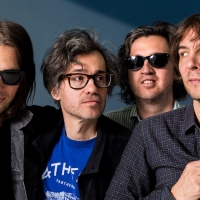 Get ready: It seems we might be getting a new Phoenix album next yearTheir last record, the glitzy, Italian summer-inspired Ti Amo, arrived back in 2017.
Get ready: It seems we might be getting a new Phoenix album next yearTheir last record, the glitzy, Italian summer-inspired Ti Amo, arrived back in 2017.

Bouncing back with Pumarosa: “I appreciate things a little bit more.”
In the last two years, the British band have gone through hell and back, coming out of the other end with an album that shows their growth.
When Pumarosa shared their debut album - 2017’s The Witch everything was looking hopeful. The record’s ten tracks twisted with a post-punk-meets-pop haze; the trials and tribulations of recording a debut album triumphed, in a moment that for the band, kickstarted this sense of momentum they’ve been building off for much of the time since. It was a critically acclaimed splash - “An album that embraces every fibre of your being,” said The Line of Best Fit; “A magnetic debut,” wrote The Observer - that introduced the band to the UK’s biggest stages in Glastonbury and Jools Holland Live.
Skip forward two years, and Pumarosa’s journey hasn’t been as clean-cut-perfect as suggested from their sudden, UK-centralised acclaim. On the same week as The Witch’s arrival, their frontwoman Isabel Muñoz-Newsome was diagnosed with cervical cancer, something that would come to put their performances on these aforementioned stages in doubt, just as their career was taking off. “They knew something was wrong, and it was right as we were about to go out on tour,” she tells DIY Magazine. “It was a very strange time, but everybody was amazing. I really felt held by the band. We carried on doing the stuff we had planned up until I had surgery in June.”
Devastation, the band’s second record, is Pumarosa coming out of the other side on top. It’s unsurprisingly optimistic, laden with catharticness you’d expect from a band bouncing back following turbulence, and confidence that would come naturally after having such a scare (today, Isabel is now clear of cancer: “Thankfully,” she says). The band have evolved too, having lost a member - bassist Henry Brown - and grown a few friends in the process (super-producer John Congleton and Tool’s Justin Chancellor), each leaving a distinct mark on Pumarosa’s changing, adaptable sound.
Underpinned with themes on confronting desire and the complex “personal destructiveness” of being thrown into such a situation so early on, Devastation is an album that doesn’t sit in one place for too long. Fall Apart, the album’s opening track, pulses with an almost drum’n’bass pace that reflects the band’s changing tastes, while Adam’s Song shifts it into a trip-hop stomp; part-Massive Attack, part-Portishead. Heaven, meanwhile, interpolates the band’s experimentation with electronica with the pop hooks that define their debut album, that on Lose Control, evolves to its most grand and triumphant; the band’s optimism and newfound sense of empowerment screaming through its grandness.
I See You is another album highlight, and one that shows that Devastation isn’t just an aptly-named record which navigates bouncing back from the album’s title. It’s instead a nuanced take on the #MeToo movement; the confidence the band have found over the last two years making itself known in other ways. “The song is about having the confidence to look back into the face of the guy who is talking you down, or taking your space, and saying ‘I see you!’,” she says. “ I'm not going to be silent or make myself small so that you can feel ok. It’s not ok! There is a swagger to enjoying power, and you can feel that in the verses of the track.”
Devastation is out now via Caroline Australia / Fiction Records. Here, we chat about the record with Pumarosa’s Isabel Muñoz-Newsome, talking about her experiences over the last two years, and how it shaped a record nobody really saw coming.
This album comes two years after your first, and I know that a debut album is a new territory that many artists struggle with, and end up learning a lot from. Was there anything you were able to take from the making and release of The Witch and apply to this record?
Yeah. In the recording studio, it's nice just not being so precious about things; understanding that this is a moment in time. The more you can accept that and just let that flow and just it let it be, the better stuff you're going to have. With The Witch, we had never made an album - it was our first time of doing this and we were so precious about it. We would try to rewrite a tune ourselves like 100 times and sometimes that's not very helpful. It actually blocks stuff. Luckily, we worked with Dan Carey, who is really good at just being like "just get over it!"
I think this time, we were allowing it to be a moment time rather than attempting to encapsulate everything I believe and know about music. It doesn't. It's an expression, and that's why it's interesting.
Do you think that making an album that's a little more 'expressive' - a little more in the moment - was a natural move considering what happened between the two records?
For all of us, that was a learning curve. Once you're doing it for the second time, you’re still definitely realising that “wow, we're so lucky to be able to be doing this, to be putting our ideas down and getting recorded like that" and I'm so grateful for that. But maybe in a way, like when something like that happens in between albums - getting cancer and getting that kind of scare - it does let you just appreciate things a little bit more. But I don't know. I think the moment in time thing with music is perhaps also a technical thing. It's like your kids, and you're just learning.
There's this sense of therapy on the album, the sense of letting go in a way - at least from a listener's take. Is that something you felt really translated into this record following the cancer scare and such?
Yeah, I guess so. After that all happened - i.e. after all the actual hospital stuff and my body recovered - other things started changing in my life, like how I was living. I don't know if it's 'letting go'... well it is, but it's not necessarily positive. For me anyhow, I didn't really deal with any of it at the time. I didn't have therapy or anything, I was just like "yeah it's better, great! Let's get on with life!" and then I started making some really quite wild decisions - it gave me a taste of not having any sense of anchorage. My body had transformed, so my mind did as well, but I hadn't noticed.
I disattached myself from everything, and that was very exciting, but also very destructive and quite thrilling. I guess it made for some exciting moments and beautiful moments, but it also was quite a destructive period. That's what the album is about, it's more about that devastation than cancer itself. It's also a process of transformation and I suppose, when something like that happens to you, especially if you don't have therapy initially, you don't really know what you're going to do. I was just rolling with it. At least we could make an album about it.
It definitely sounds like you had a lot to write about after this whole experience. What was going back into the writing/recording process following this look like?
It was quite mad. There were all these weird changes happening inside the band and in my life and relationships - everything was getting turned on its head, but we would still meeting two days a week and writing this album. It was very strange. It was also very productive, but it was so bizarre - "oh god, what is my life!".
Throughout the whole period - from mainly 2018, when everything was taking off until now - we were writing the whole time. Then, at the end of the year, we recorded it, so it's this kind of documentation of this very turbulent period with a lot of stuff happening. It's all in there.
This album is quite different to the first sonically. Do you think that's a result of the changing headspace and everything that went into the record before it was actually recorded?
I think it's just because we need to grow. It's not only my journey too: Tomoya [Suzuki], who plays the keys, electronics and saxophone, was much more of a saxophone player when we started, and then we gave him a really early 80s-era KORGs, and he started playing that. Now, he has like an armoury of amazing equipment, cobbled together and modded to be messed around. He's obsessed and has gotten much more into electronic music as a result. That's definitely more of a part of our sound now.
Nicholas [Owen] with his drums is another example - he has learnt and has been exploring so many new things. There's a lot of times where we'd be jamming, and they'll be doing this really cool stuff with instruments where'd they would be almost passing the beat between each other almost. You can hear that on Fall Apart and Adam's Song on this record, and that's something I don't think we could've done before - trip-hop beats that have grown together into this machine/drum/man thing.
For me, I put down my electric guitar on this album - I wanted to move more, and have a bit more freedom on stage. Also, I wanted to like give the others more space because they'd been playing the whole time and everyone's learning new sounds and I wanted everyone to be super expressive.
There's one song I wanted to talk about on the album titled I See You, because it's the song that I think highlights this cleansing, letting go feeling the most. It's also one that assumedly comes with a lot of power, being able to say "shut up and back off" to dudes in the crowd. It feels like that's the song that holds the most sense of empowerment.
Yeah. That was a funny one. It had that theme, kind of, and then a few things were happening in my life and also my sister's life. There was weird stuff happening to her at her work, which definitely wasn't cool, and she'd turn around and just be like "listen, this isn't cool, it's making me feel uncomfortable, and we need to talk about it" - and she made everyone in the office talk about it. Having the confidence to do that... it took a lot of strength I think. Being confident and being able to turn around and look at people in the eye and publicly say something requires a huge amount of strength and you've got to get yourself ready in a way.
I was just really impressed and it made me also behave a bit differently in a few situations. They weren't as acute, but situations where I was like "ahhh I'm kind of being told what to do here and I don't like it." After a few phone conversations, I just wrote all of it. I wanted people to know that they can take that power. We all know that it's there, but to address it takes strength. When you can, it's so empowering though - you don't have to talk softer to guys in the room, and you don't have to give them space, because it's taking your own, and that's not good. You have to branch out.
Do you think this is something that's changing in the music world? This... increasing sense of women actually telling guys to shut up and putting them in their place?
Yeah. I think that in the past, these instances might've seemed funny, and if you didn't, that's your problem. I think things are changing now though, and even in more subtle ways. I've been talking to girlfriends, and even sometimes if you're out and dancing even with friends in a certain way, male friends may glance at you or something, and it's like "that's not cool, and I'm not getting pleasure here." Stuff like that is less acceptable.
In the scope of that song though, I think it's more about just being in a group situation, for example, where often it will be the men's voices that you keep hearing even in a friendly situation - dinner or something. I think that even now, there might be a tiny little look of acknowledgement, and it's like, if you mention it people are like "Oh, yeah" rather than just purely offended. I think it's just that thing of being aware, and just giving each other space. It doesn't only happen to women either, it could be for whatever reason - it might not just be a feminist thing - but giving the respect and space and acknowledging the differences between us and that we're not all the same. We're not all homogeneous - everyone is being who they are and it's important to respect that.
Pumarosa's second album, Devastation, is out now via Fiction Records / Caroline Australia.
Follow Pumarosa: FACEBOOK
 Get ready: It seems we might be getting a new Phoenix album next yearTheir last record, the glitzy, Italian summer-inspired Ti Amo, arrived back in 2017.
Get ready: It seems we might be getting a new Phoenix album next yearTheir last record, the glitzy, Italian summer-inspired Ti Amo, arrived back in 2017.
 Premiere: Waxflower share the clip for latest single Together ahead of AU tourBuilding off their break-out year, the Brisbane band are launching into 2020 with an east-coast run of dates.
Premiere: Waxflower share the clip for latest single Together ahead of AU tourBuilding off their break-out year, the Brisbane band are launching into 2020 with an east-coast run of dates.